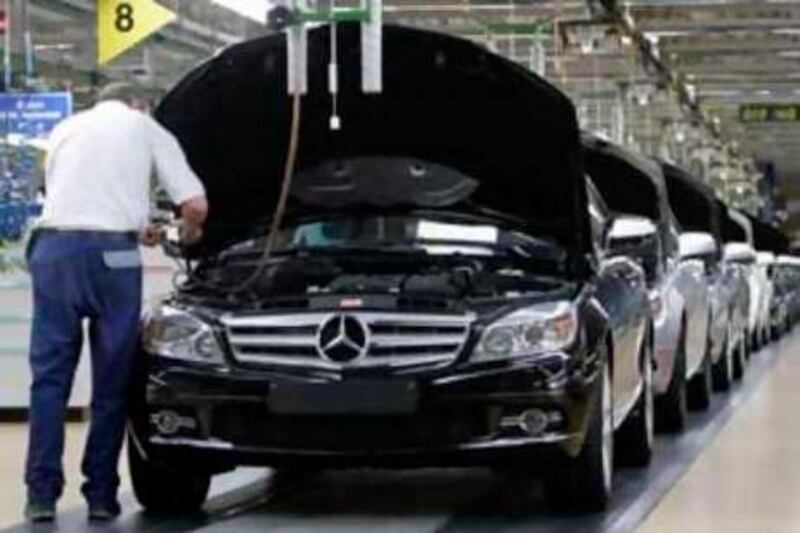As car makers fret over a precipitous fall in new vehicle sales around the globe, the Middle East is emerging as one of the last bastions for market growth, but lack of access to consumer credit could dampen business in the region. Despite three months of uncertainty as credit and recession worries began to infect Gulf economies, car makers such as Mercedes Benz of Germany and the US giant, General Motors, are reporting slowing but still positive growth. To keep sales running, Mercedes-Benz said it was investing heavily in the region. It is in the process of establishing Daimler Financial Services to offer finance and insurance to its customers, and will soon open the world's largest Mercedes-Benz dealership in Abu Dhabi. The news comes as dire warnings are sounded by manufacturers in the US and Europe of incredibly challenging conditions ahead. Germany's leading industry trade group said yesterday it predicted car sales next year to be the worst in nearly two decades. The German Association of the Automotive Industry said in a report that the car market "has taken a downwards tumble at a pace and magnitude that has never happened before". It forecast 2.9 million new sales, down from 3.1 million this year. The fall in sales is due to a draining of consumer confidence worldwide, with major macroeconomic consequences for the US and Germany. In the US, the "big three" - GM, Ford and Chrysler - are asking for a US government bailout of US$34 billion (Dh124.88bn) just to stay afloat. In Germany, nearly 2,000 core personnel were cut in September and another 10,000 part-time jobs were shed last month, according to industry estimates. A five-month slide in the value of the euro against the dollar is also hitting European car makers. However, between January and last month deliveries were up 18 per cent in the Middle East and Levant for Mercedes-Benz. Frank Bernthaler, the regional director of sales and marketing for Mercedes-Benz, said the company delivered 1,517 vehicles last month, a figure "slightly higher" than the same period last year, suggesting slowing growth. "I think in today's environment this is an achievement," he said. Similarly, GM sales in the UAE were already 28 per cent higher year-on-year in the first 10 months of 2008, said Mike Devereux, the newly appointed president of GM in the Middle East. The figures are much lower than first-half results, which do not account for the recent economic slowdown. Research by Business Monitor International shows car sales in the UAE rose 37 per cent in the first six months of the year. "We're continuing to invest here," said Mr Devereux. The Middle East makes up about 2 per cent of GM's worldwide sales, or 150,000 units out of a total of nine million. Dealerships are waiting to see the effects of a tightening credit market in the region, however. Mr Devereux said sales were up year-on-year in the region, but had slowed in the past two months by about 10 per cent because of strangled credit markets. In the UAE market, 70 per cent of GM vehicles are bought on credit. "In the Middle East the approval rates on consumer credit have gone down dramatically in the last 65 days," he said. Up to 30 per cent of loan applications are being rejected, compared with 5 per cent just months ago. At Mercedes-Benz, Mr Bernthaler agreed, saying: "I would say we are starting to see rejections that we did not have before." * with Associated Press and additional reporting by Andrew Foxwell igale@thenational.ae
Car sales show growth in region
The Middle East is one of the few bright spots for the beleaguered international car industry.

Editor's picks
More from the national





